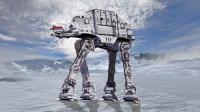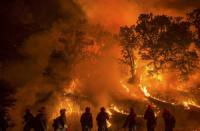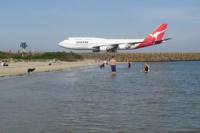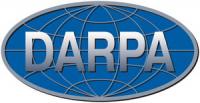-
Climate change already affecting global food production—unequally
The world’s top 10 crops — barley, cassava, maize, oil palm, rapeseed, rice, sorghum, soybean, sugarcane, and wheat — supply a combined 83 percent of all calories produced on cropland. Yields have long been projected to decrease in future climate conditions. Now, new research shows climate change has already affected production of these key energy sources — and some regions and countries are faring far worse than others.
-
-
ARCHANGEL: Securing national archives with AI and blockchain
Researchers are using its state-of-the-art blockchain and artificial intelligence technologies to secure the digital government records of national archives across the globe – including the U.K., Australia, and the United States of America.
-
-
The economic cost of devastating hurricanes and other extreme weather events is even worse than we thought
June marks the official start of hurricane season. If recent history is any guide, it will prove to be another destructive year thanks to the worsening impact of climate change. If this is not bad enough, there is this: a meaningful assessment of the costs of climate change – using basic economic principles I teach to undergrads – paints a scary picture indeed.
-
-
Silicon Valley’s scramble for China
In August 2012, China launched one of its first major “smart city” projects for the remote oil town of Karamay in the autonomous province of Xinjiang. “Information technology is not just about technology. It should be integrated with all aspects of life in our city and make people’s lives more convenient,” said then Karamay Mayor Chen Xinfa. Nafeez Ahmed writes in Coda Story that A report released last year by subsidiary Deloitte China, titled “Super Smart City: Happier Society with Higher Quality,” celebrates China’s drive to build “super smart cities” which integrate data across services like health care, transport, education and public safety. Billed by Deloitte as a virtual utopia, China’s smart cities represent the biggest and most intrusive surveillance architecture ever built by any single nation, according to experts and analysts.
-
-
Huawei and the U.S.-China supply chain wars: The contradictions of a decoupling strategy
In two dramatic policy announcements last month, the Trump administration effectively barred U.S. companies and government agencies from buying telecommunications equipment or services from – or selling any components to – Chinese technology champion Huawei. President Donald Trump signed a broadly phrased executive order restricting any transaction of information communication technology (products or services linked to a “foreign adversary” deemed to pose an “unacceptable risk to the national security of the United States”), while the Commerce Department placed Huawei the company and its affiliates on its Entity List – a designation that requires U.S. firms and foreign companies selling products that contain American components to acquire a license from the U.S. government before trading with a blacklisted company. Darren Lim and Victor Ferguson write in War on the Rocks that these moves represent the latest steps towards “decoupling,” the unwinding of the interlocking supply chains and trading relationships that have made the U.S. and Chinese economies so deeply interdependent over the past two decades. Whether deliberate or not, the restrictions on Huawei have prompted some to argue that we are witnessing the collapse of an open, global market for information communication technology goods and services. Others cite the new policies as the latest confirmation of an emerging “economic” or “technology” Cold War between China and the United States.
-
-
A study exposes the health risks of gene-editing human embryos
A missing chunk of DNA – called Δ32 mutation —is 32 base pairs long and smack in the middle of the CCR5 gene, might be the most studied mutation in human history. The spontaneous deletion, which arose thousands of years ago, has a striking relationship with one of the worst human diseases: HIV/AIDS. People who inherit this mutation from both of their parents are naturally immune. last year, a Chinese scientist named He Jiankui used Crispr to try to endow two human embryos with the Δ32 mutation and immunity to HIV. Megan Molteni writes in Wired that last week, it emerged that fertility clinics around the world have been seeking He’s advice on offering a CCR5 Crispr edit as a service to prospective parents. Now, new research is suggesting that such a procedure might actually be an early death sentence.
-
-
Agile scouting robots

Researchers have developed an agile robot, called Salto, that looks like a Star Wars Imperial walker in miniature and may be able to aid in scouting and search-and-rescue operations. Robots like this may one day be used to save lives of both warfighters and civilians, researchers said.
-
-
More intense wildfires are here to stay, and we need to adapt

Update on state of Canada’s mountain regions looks at human scale of ecological disaster wrought by changing climate. “Events that a decade ago we would call ‘100-year events’ are quickly becoming the norm,” said one researcher. We need to talk “about ways we can coexist with fire because it is our new reality.”
-
-
Rising seas threaten Australia’s major airports – and it may be happening faster than we think

Most major airports in Australia are located on reclaimed swamps, sitting only a few meters above the present-day sea level. And the risk of sea level rise from climate change poses a greater threat to our airports than we’re prepared for. Given the significant disruption cost and deep uncertainty associated with the timing of sea level rise, we must adopt a risk-based approach which considers extreme sea level rise scenarios as part of coastal infrastructure planning.
-
-
Rural areas more vulnerable to sea-level rise

Type “sea-level rise” in an internet search engine and almost all the resulting images will show flooded cities. But there is a growing recognition that sea-level rise will mostly impact rural land–much of it privately owned—where existing knowledge is insufficient o best inform private and public decisions on how to cope with the threat.
-
-
Scent-based strategy blocks mosquito transmission of disease
Could it be that your scent is just a bit too attractive? It is known that mosquitoes are drawn to certain human chemical odors that lead the insects to sources of food. New technology would temporarily modify skin microbiome to reduce attraction of disease-causing mosquitos by altering human scents.
-
-
Can we prepare for climate impacts without creating financial chaos?
Likely sooner than we think, the destruction that warmer global temperatures are inflicting — through record floods, wildfires, droughts, and hurricanes — could physically overwhelm our ability to maintain many communities in their existing form. Communities face a tricky dilemma as climate changes: How to prepare for impacts without scaring away homeowners and investors and setting off a damaging economic spiral.
-
-
Small device alerts responders to changes to thermal conditions
When firefighters rush into burning buildings, they know the thermal environment may change in a matter of seconds, exposing them to potentially lethal temperatures. Burn Saver is a body-worn technology that continuously monitors thermal conditions and warns firefighters when those conditions become threatening.
-
-
DARPA tests advanced chemical sensors

DARPA’s SIGMA program, which began in 2014, has demonstrated a city-scale capability for detecting radiological and nuclear threats that is now being operationally deployed. DARPA is building off this work with the SIGMA+ initiative that is focused on providing city- to region-scale detection capabilities across the full chemical, biological, radiological, nuclear, and explosive threat space.
-
-
China raises threat of rare-Earths cutoff to U.S.
With a simple visit to an obscure factory on Monday, Chinese President Xi Jinping has raised the specter that China could potentially cut off supplies of critical materials needed by huge swaths of the U.S. economy, underscoring growing concerns that large-scale economic integration is boomeranging and becoming a geopolitical weapon. Keith Johnson and Elias Groll write in Foreign Policy that Beijing could slam every corner of the American economy, from oil refineries to wind turbines to jet engines, by banning exports of crucial minerals.
-
More headlines
The long view
Autonomous Vehicle Technology Vulnerable to Road Object Spoofing and Vanishing Attacks
Researchers have demonstrated the potentially hazardous vulnerabilities associated with the technology called LiDAR, or Light Detection and Ranging, many autonomous vehicles use to navigate streets, roads and highways. The researchers have shown how to use lasers to fool LiDAR into “seeing” objects that are not present and missing those that are – deficiencies that can cause unwarranted and unsafe braking or collisions.
Tantalizing Method to Study Cyberdeterrence
Tantalus is unlike most war games because it is experimental instead of experiential — the immersive game differs by overlapping scientific rigor and quantitative assessment methods with the experimental sciences, and experimental war gaming provides insightful data for real-world cyberattacks.
Prototype Self-Service Screening System Unveiled
TSA and DHS S&T unveiled a prototype checkpoint technology, the self-service screening system, at Harry Reid International Airport (LAS) in Las Vegas, NV. The aim is to provide a near self-sufficient passenger screening process while enabling passengers to directly receive on-person alarm information and allow for the passenger self-resolution of those alarms.
Falling Space Debris: How High Is the Risk I'll Get Hit?
An International Space Station battery fell back to Earth and, luckily, splashed down harmlessly in the Atlantic. Should we have worried? Space debris reenters our atmosphere every week.
Testing Cutting-Edge Counter-Drone Technology
Drones have many positive applications, bad actors can use them for nefarious purposes. Two recent field demonstrations brought government, academia, and industry together to evaluate innovative counter-unmanned aircraft systems.
Strengthening the Grid’s ‘Backbone’ with Hydropower
Argonne-led studies investigate how hydropower could help add more clean energy to the grid, how it generates value as grids add more renewable energy, and how liner technology can improve hydropower efficiency.
